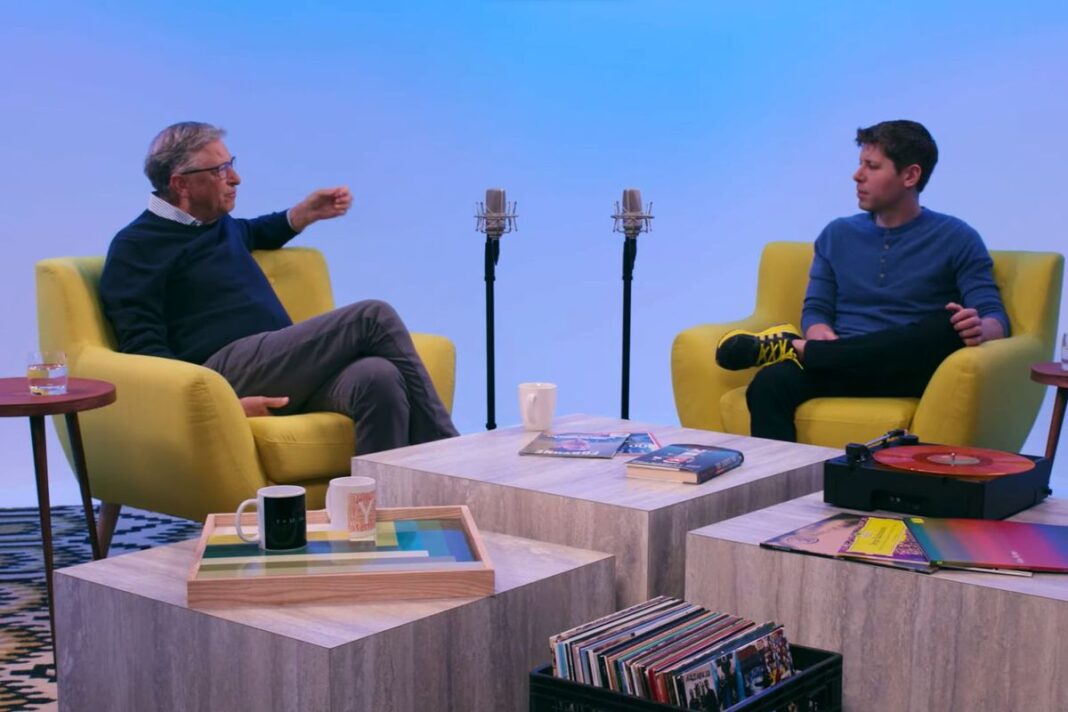In a candid conversation with CEO Sam Altman, Microsoft co-founder and philanthropist Bill Gates revealed his admiration for ChatGPT, the AI language model that has taken the world by storm. “I didn’t expect ChatGPT to get so good. It blows my mind,” Gates said in the latest episode of the .
This comes after all the drama of OpenAI and then again Altman joining the firm, promptly hinting at joining Microsoft. Gates, who has been a vocal advocate for innovation and social good, shared his initial doubts about the potential of ChatGPT, which can generate coherent and engaging texts on various topics. “I was privileged to see your work as it evolved, and I was very skeptical.
I didn’t expect ChatGPT to get so good. It blows my mind,” he confessed. Altman, the CEO of OpenAI, the research organization behind ChatGPT, explained that led to the development of the AI model.
He compared the neural networks that power ChatGPT to the human brain and expressed optimism about gaining more insights into the inner workings of the AI system. “We are still learning how to understand the encoding behind ChatGPT’s impressive language generation,” he said. The podcast also explored AI’s future directions and applications, with Altman highlighting the goals and expectations for the next two years.
He mentioned multimodality, which involves integrating speech, images, and video with text, as a key feature of the next-generation AI models. He also emphasized the need to improve AI systems’ reasoning ability, reliability, customizability, and personalization. Gates, who showed keen interest in the technical aspects of AI, asked Altman about the control logic and the computational resources required for solving complex problems with AI.
He suggested that more sophisticated transformations and adaptive computing might be necessary to achieve higher levels of AI performance. Altman agreed, saying, “At a minimum, it seems like we need some sort of adaptive compute. We may need much more sophisticated things beyond it.
” The podcast also touched upon the potential impact of AI on global affairs, with Altman proposing the establishment of an International Atomic Energy Agency (IAEA)-like body for regulating AI. He stressed the need for global cooperation in dealing with advanced AI systems’ profound societal and geopolitical implications. Gates shared his vision of AI playing a positive role in preserving democracy by addressing issues like polarisation.
He highlighted the potential of AI in fostering world peace and social cohesion. Microsoft and OpenAI have actively engaged in AI regulatory discussions with key stakeholders, including the White House, senators, and world leaders. The podcast shed light on their thoughts regarding regulating powerful AI systems, with Altman expressing the expectation that technology will rapidly advance towards systems with immense computational capabilities.
Altman highlighted the potential impact of technology and its ability to influence society and geopolitical power balance. He emphasized the need to establish a global regulatory body similar to the International Atomic Energy Agency (IAEA). Altman expressed his belief in the need for a global regulatory body to oversee super-powerful systems due to their potential global impact.
He suggested a model similar to the International Atomic Energy Agency (IAEA) as a possible solution. Altman drew a parallel to the regulation of nuclear energy, which also required a global agency due to its potential impact on a global scale. Altman elaborated on the regulatory framework, drawing parallels with nuclear energy regulation.
He proposed a global agency to oversee the most powerful AI systems, ensuring safety audits and international cooperation in addressing the challenges posed by these technologies. Despite acknowledging that this approach won’t prevent all risks, Altman believes it can mitigate the most significant threats. In a lighter moment, Altman revealed his most frequently used app on his phone, and it was not what many would expect.
“So, what application on your phone do you use the most?” Gates asked. Altman confessed, “Slack. I wish I could say ChatGPT.
” The revelation prompted further discussion as Gates probed Altman about his choice, questioning whether it surpassed even email usage. Altman responded, “Way more than email. The only thing that I was thinking possibly was iMessages, but yes, more than that.
” Altman is known to be heavily involved in the coordination efforts at OpenAI, and he attributed much of his daily routine to the extensive use of Slack. In contrast, Gates revealed that he prefers to use Outlook for email and the browser for news, as he characterizes himself as an “old-style email guy. ” Altman chimed in, saying that although he may use the browser more often, he still believes that he spends most of his time on Slack.
The discussion extended to the potential of AI contributing to global peace and reducing polarisation. Gates expressed optimism about AI’s ability to address complex human problems, such as fostering individual harmony. Altman echoed this sentiment: “The technology will surprise us with how much it can do.
” The podcast lasted for half an hour and was widely praised by listeners for its insightful and engaging discussion on AI. Many expressed admiration for ChatGPT, and some even joked that the AI model might have generated the podcast. .
From: interestingengineering
URL: https://interestingengineering.com/culture/ai-in-focus-gates-and-altman-discuss-future-regulation-and-peace



